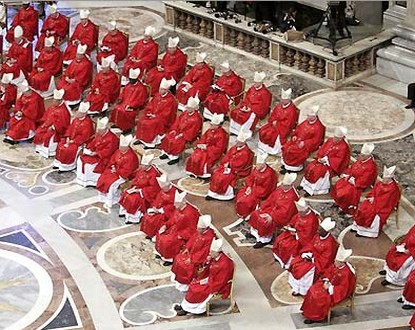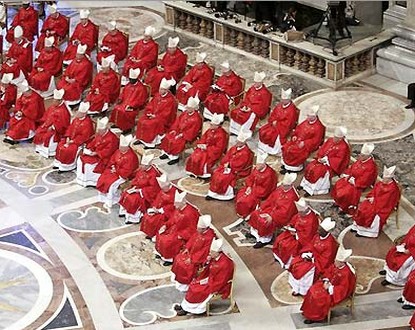Announced as the mobilization of Eastern Christians, the Synod of Bishops of the Middle East concluded its work by adopting specific measures where broad-scale decisions were expected. A low profile, which according to our editorialist, reflects the limited room for maneuver of pontifical diplomacy towards Judaism and Islam. It does not at all resolve the eventual disappearance of Christians in this region of the world.
 Convened by the Holy Father last September to discuss the “disappearance” or even the simple “weakening of Eastern Christians,” which would be a “universal loss for the Church” of Rome (See: Synod of Rome on the Middle East, a mobilization of Eastern Christians against radical Islam), the Special Assembly for the Middle East of the Synod of Bishops has just ended, seemingly in some confusion. It took a “benevolent decision” from Benedict XVI to authorize the Synod’s General Secretariat to publish “an unofficial version of the participants’ proposals.” A pseudo-final communiqué intended to cast a gentle and consensual veil over the often polemical speeches given during the conclave.
Convened by the Holy Father last September to discuss the “disappearance” or even the simple “weakening of Eastern Christians,” which would be a “universal loss for the Church” of Rome (See: Synod of Rome on the Middle East, a mobilization of Eastern Christians against radical Islam), the Special Assembly for the Middle East of the Synod of Bishops has just ended, seemingly in some confusion. It took a “benevolent decision” from Benedict XVI to authorize the Synod’s General Secretariat to publish “an unofficial version of the participants’ proposals.” A pseudo-final communiqué intended to cast a gentle and consensual veil over the often polemical speeches given during the conclave.
Contrary to the preparatory document of the “Lineamenta,” which was much more daring since it highlighted the “rise of political Islam” and the “recourse to violence” by some Muslims to “impose an Islamic way of life” in several societies in this part of the world, the “final proposals of the Synodal Fathers” edited by the Vatican are purged—”censored” according to others—of the strongest contributions concerning the sometimes stormy relations of Christianity with the other two monotheisms, Judaism and Islam. An apparently very selective censorship: it is all the more difficult to ignore since the Osservatore Romano, the quasi-official newspaper of the Vatican, does not seem to have shared the Curia’s scruples, deciding to publish, according to its own criteria, several extracts. As evidenced by the speech of Cyrille Salim Boulos, Archbishop of Newton of the Greek Melkites (USA), criticizing the “justification of the Israeli occupation of Palestinian land” based on the biblical concepts of “promised land” and “chosen people.” Its publication by the Italian daily thus prompted a firm clarification from the spokesperson of the Israeli Ministry of Foreign Affairs: the latter lamented the absence of “wisdom to revive interpretation disputes of texts extinguished since the Middle Ages.” This did not prevent it from feeding the ever-hungry dynamic of anti-Semitism and anti-Judaism.
The same goes for the Lebanese Archbishop of Antioch Raboula Antoine Beylouni, whose contribution was disseminated by the Osservatore Romano’s site with, however, numerous cuts allegedly requested by the Vatican Secretariat. In his original text, the titular Archbishop of Mardin and Bishop of Curia of Antioch of the Syrians violently attacked the Quran, which “inculcates in Muslims the pride of having the true and complete religion,” bringing them, in his opinion, “to dialogue with this superiority and assurance of being victorious.” To the point, asserts the prelate, of “giving the same value to dogma as to any law or practice.”
The mountain of “Lineamenta” has ultimately given birth to a mouse: a minimalist text often taking refuge in evangelical esotericism, the responses of the Synodal Fathers drown in the most timid caution: “it will be necessary,” begins the final document, “to draw the world’s attention to the dramatic situation of certain Christian communities in the Middle East, who suffer all kinds of difficulties, sometimes leading to martyrdom.” Back to square one despite a few very practical recommendations: have the Jesuits taken power at the Roman Curia by imposing their “Contemplatio in actionem”? In any case, the Church of Peter “urges its faithful not to succumb to the temptation to sell their real estate properties” and creates a “commission charged with countering, through development projects, the motivations of the migratory phenomenon.” The young Eastern Christians—”the future of the Church” according to John Paul II’s words—are primarily targeted by this measure.
Finally, for the two other religions of the Book, the text sticks to old, worn-out formulas: it recalls the attachment to the “Nostra aetate” declaration of the Vatican II Council to encourage dialogue with Jews, the rejection of anti-Semitism and anti-Judaism, and the “continuation of fruitful life dialogue with Muslims.” Initially rather assertive, the work of this Synod ultimately results in adopting measures with little scope, a low profile unlikely to meet the expectations of Eastern Christians whose intense concern motivated the initiative. Caught between his Regensburg speech and the beatification process of Pius XII, Benedict XVI now arouses the suspicion of both Muslims and Jews. There remains a very small place for Christians: that of exile?




